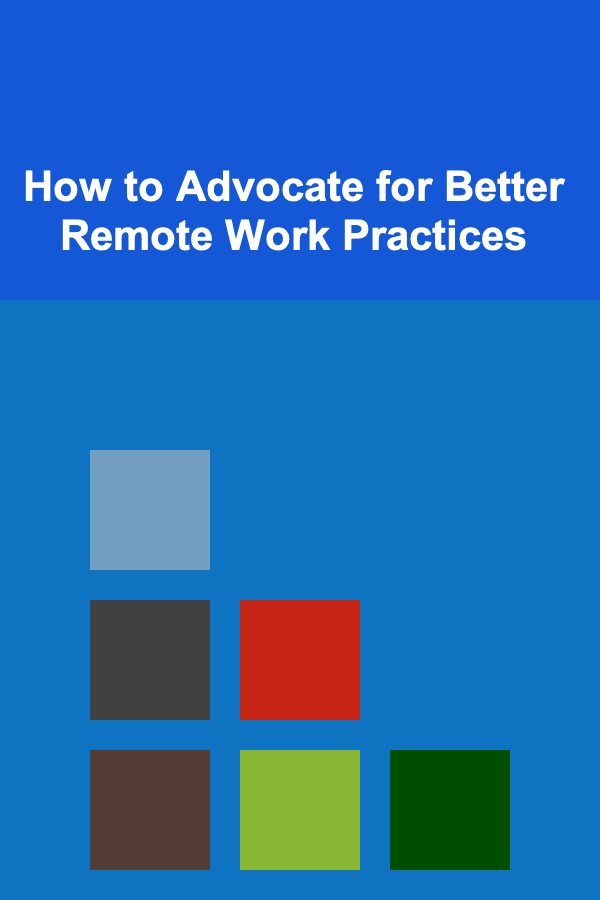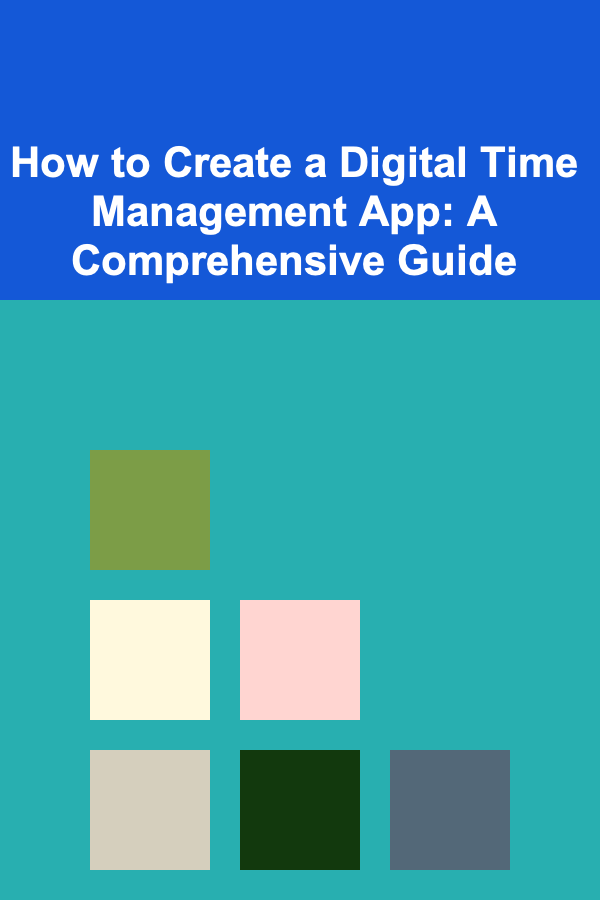
10 Tips for Building a Personal Brand as a Career Planner
ebook include PDF & Audio bundle (Micro Guide)
$12.99$10.99
Limited Time Offer! Order within the next:

In today's competitive job market, career planners are increasingly using personal branding to stand out, attract clients, and establish themselves as experts in their field. Building a personal brand is about more than just self-promotion; it's about creating an authentic identity that resonates with your target audience and reflects your expertise, values, and mission. Whether you're a career coach, a recruitment consultant, or an individual looking to enhance your professional reputation, establishing a strong personal brand can elevate your career and business.
In this article, we'll explore 10 essential tips to help you build a personal brand as a career planner, from defining your niche to leveraging social media platforms.
Define Your Niche and Expertise
The first step in building a personal brand is to clearly define your niche. As a career planner, your expertise might span across various areas, but focusing on a specific niche allows you to target your efforts and cater to a more defined audience. Do you specialize in resume writing, interview coaching, career transitions, or perhaps career advancement for a particular industry? Defining your niche helps you stand out from others in your field.
How to Define Your Niche:
- Reflect on your experiences and areas where you excel.
- Identify the specific problems you solve for your clients.
- Consider your target audience's needs and preferences.
- Analyze the market to determine where there is demand.
By defining your niche, you'll create a clear and consistent message that sets you apart from competitors and attracts the right clientele.
Craft a Strong Value Proposition
Your value proposition is a statement that clearly explains the unique benefits you offer to your clients. It's a critical component of your personal brand and should succinctly convey why someone should choose you as their career planner. A strong value proposition helps potential clients understand the tangible outcomes they can expect by working with you.
How to Create a Strong Value Proposition:
- Focus on the results your clients will achieve.
- Emphasize the specific expertise you bring to the table.
- Keep it concise and to the point.
- Align it with the pain points of your target audience.
For example, instead of simply stating, "I help people find jobs," you could refine it to, "I empower mid-career professionals to transition into fulfilling leadership roles with tailored career coaching and strategies."
Establish Your Online Presence
In the digital age, your online presence is one of the most important aspects of your personal brand. As a career planner, your potential clients are likely to search for you online before deciding to work with you. Building a strong online presence allows you to showcase your expertise, connect with your audience, and expand your reach.
Key Elements of Online Presence:
- Website: Your website should serve as the hub of your personal brand. It should clearly convey your services, expertise, and value proposition, and include testimonials, case studies, and resources that showcase your work.
- Blog: Regularly writing blog posts about career development, job search strategies, or industry insights can establish you as a thought leader in your field.
- Social Media: Platforms like LinkedIn, Twitter, Instagram, and Facebook are excellent tools for sharing your expertise, engaging with your audience, and building credibility.
Your website and social media profiles should be consistent in terms of messaging, visuals, and tone. This consistency builds trust and reinforces your brand identity.
Share Valuable Content Consistently
One of the most effective ways to build a personal brand as a career planner is by sharing valuable content that educates and inspires your audience. By providing free resources, advice, and insights, you demonstrate your expertise and build relationships with potential clients.
Types of Content to Share:
- Career Tips: Offer actionable tips on job search strategies, resume writing, interview preparation, and career growth.
- Success Stories: Share testimonials and case studies of clients who have achieved career success with your help.
- Industry Insights: Post about the latest trends in the job market, changes in hiring practices, and the future of work.
- Interactive Content: Host webinars, Q&A sessions, or live chats where you can engage with your audience directly.
Consistent content sharing helps you stay top-of-mind for your audience, keeping them engaged with your brand while positioning you as an authority in your field.
Network and Collaborate with Others
Networking is an essential part of building your personal brand. As a career planner, it's important to connect with others in your industry, collaborate with colleagues, and engage with potential clients. Networking can open doors to new opportunities, collaborations, and partnerships that will enhance your credibility and visibility.
Ways to Network:
- Attend Industry Events: Whether in-person or virtual, career conferences, workshops, and seminars offer opportunities to meet like-minded professionals.
- Collaborate with Influencers: Partnering with influencers or thought leaders in the career development space can expose your brand to a wider audience.
- Join Professional Associations: Becoming a member of organizations like the National Career Development Association (NCDA) can help you connect with peers and stay updated on industry trends.
Networking also involves engaging with your audience on social media platforms and participating in relevant online groups and forums.
Build Credibility with Testimonials and Case Studies
Social proof is a powerful tool in building your personal brand. Testimonials, case studies, and client reviews can demonstrate the value you provide to others and build trust with potential clients. By showcasing real success stories and feedback from clients, you position yourself as a trusted and effective career planner.
How to Collect Testimonials:
- Request Feedback: After working with clients, kindly ask them to provide a testimonial about their experience working with you.
- Showcase Success Stories: Share detailed case studies of clients who achieved career milestones, such as landing a new job, getting promoted, or transitioning into a new field.
- Leverage Reviews: Encourage clients to leave reviews on platforms like Google or LinkedIn, where potential clients can easily find them.
The more credible social proof you have, the easier it will be to build trust and attract new clients.
Engage with Your Audience Authentically
Building a personal brand is not just about broadcasting information; it's about engaging with your audience and building genuine relationships. When you engage authentically, you demonstrate your commitment to your clients' success, and this creates a sense of connection that fosters trust and loyalty.
How to Engage Authentically:
- Respond to Comments and Messages: Whether on social media or your website, take the time to respond to questions, comments, and messages from your audience.
- Ask for Feedback: Regularly ask your followers and clients for feedback on your content and services to show that you value their input.
- Share Personal Stories: Opening up about your own career journey or challenges can humanize your brand and make you more relatable.
Authenticity builds a strong emotional connection with your audience, which can ultimately drive word-of-mouth referrals and repeat business.
Leverage Public Speaking and Media Appearances
Public speaking and media appearances can dramatically elevate your personal brand by positioning you as a leading expert in your field. Whether you're speaking at a conference, hosting a webinar, or participating in a podcast, these opportunities give you the chance to showcase your knowledge to a larger audience.
How to Leverage Public Speaking:
- Pitch to Conferences and Workshops: Look for opportunities to speak at career development conferences, workshops, and other industry events.
- Start Your Own Webinar or Podcast: Hosting your own webinar or podcast series allows you to share valuable insights and engage with your audience on a deeper level.
- Guest Appearances: Reach out to media outlets, podcasts, or YouTube channels to offer your expertise as a guest speaker or contributor.
Speaking engagements help you build authority, gain visibility, and connect with potential clients on a more personal level.
Stay Consistent with Your Messaging
Consistency is key when it comes to personal branding. Your messaging, visuals, and tone should remain consistent across all platforms to reinforce your brand identity. This helps your audience recognize your brand instantly and ensures that your message is clear and cohesive.
How to Maintain Consistency:
- Create Brand Guidelines: Develop guidelines for your brand's visual elements (e.g., colors, fonts, logo) and tone of voice to ensure consistency across all platforms.
- Stick to a Content Schedule: Post regularly on your website and social media accounts, ensuring that your content is timely and relevant to your audience.
- Be True to Your Brand: Stay authentic to your mission, values, and expertise in everything you do. Avoid chasing trends that don't align with your core identity.
Consistency builds trust and ensures that your audience always knows what to expect from your brand.
Continuously Evolve Your Personal Brand
Building a personal brand is not a one-time activity---it's an ongoing process. As a career planner, you must continue to evolve your brand in response to changes in the job market, client needs, and industry trends. Stay curious, keep learning, and adapt your brand strategy accordingly.
Tips for Evolving Your Brand:
- Stay Updated: Continuously educate yourself about the latest career development trends and tools to stay relevant.
- Seek Feedback: Regularly ask for feedback from clients, colleagues, and mentors to identify areas for improvement.
- Experiment and Innovate: Don't be afraid to try new content formats, marketing strategies, or service offerings to keep your brand fresh and exciting.
An evolving personal brand keeps you competitive and ensures that you remain valuable to your audience in the long term.
Conclusion
Building a personal brand as a career planner requires dedication, authenticity, and consistency. By defining your niche, sharing valuable content, engaging with your audience, and continuously evolving your brand, you can establish yourself as a trusted expert in the field. Your personal brand is not just a marketing tool---it's a reflection of your values, expertise, and commitment to helping others achieve career success. With the right approach, your personal brand will help you attract clients, build relationships, and stand out in a competitive marketplace.
Reading More From Our Other Websites
- [Hiking with Kids Tip 101] How to Plan a Safe and Fun Summer Hiking Adventure with Kids Under Five in National Parks
- [Weaving Tip 101] Budget-Friendly Weaving Studio Setup: DIY Hacks and Affordable Upgrades
- [Weaving Tip 101] Looming Opportunities: Transforming Life's Tangled Threads into Fresh Starts
- [Scrapbooking Tip 101] How to Craft Personalized Scrapbook Covers Using Laser‑Cut Techniques
- [Sewing Tip 101] Decoding Sewing Pattern Symbols: A Quick Reference Guide
- [Personal Care Tips 101] How to Heal Cracked Hands with Hand Cream
- [Personal Care Tips 101] How to Pair a Facial Scrub with Other Skincare Products for Maximum Results
- [Weaving Tip 101] From Plastic Bottles to Artful Baskets: Step-by-Step Guide to Recycled Material Weaving
- [Organization Tip 101] How to Develop an Inventory Plan for Expensive Items
- [Ziplining Tip 101] Best Zipline Night Rides Under Starry Skies with LED‑Illuminated Cables

How to Advocate for Better Remote Work Practices
Read More
How to Create a Digital Time Management App: A Comprehensive Guide
Read More
How to Regulate Blockchain Technology Effectively
Read More
How to Set Up an Eco-Friendly Craft Supply Storage
Read More
How to Simplify Your Daily Routine for Less Clutter
Read More
How To Understand the Basics of EV Motors
Read MoreOther Products

How to Advocate for Better Remote Work Practices
Read More
How to Create a Digital Time Management App: A Comprehensive Guide
Read More
How to Regulate Blockchain Technology Effectively
Read More
How to Set Up an Eco-Friendly Craft Supply Storage
Read More
How to Simplify Your Daily Routine for Less Clutter
Read More